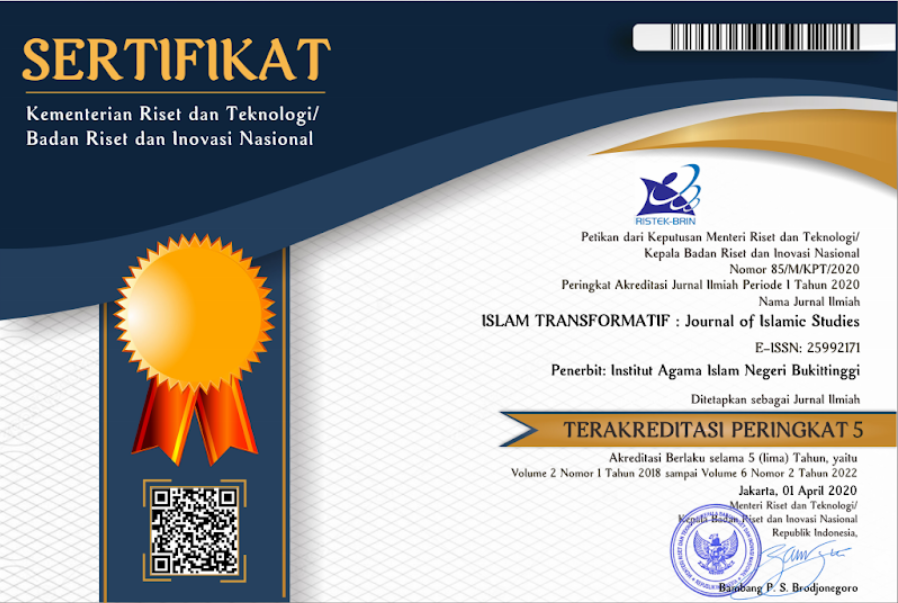The Actualization of Tazkiyatun Nafs Values in The Moral Development of Students of The Ulul Albab Islamic Studies Organization (KSI) UIN Padang
DOI:
https://doi.org/10.30983/it.v5i2.4970Keywords:
Value actualization, Tazkiyatun Nafs, KSIAbstract
This study focuses on examining the actualization of the values of Tazkiyatun Nafs in the moral development of the students of the KSI Ulul Albab organization UIN Imam Bonjol. The thought of Imam Al-Ghazali and other scholars about the tazkiyatun nafs is very interesting and important to apply as a moral basis in developing the morals of the people, especially the development of the younger generation. By using descriptive qualitative research by conducting interviews with students who are active in KSI, it is concluded that the actualization of the values of tazkiyah al-nafs in building morals and religious character in instilling noble souls and having al-karimah character. then from the application of the values of tazkiyah al-nafs it also includes a strategy in the habituation of students of the KSI Ulul Albab organization in the hope of creating student discipline and changing bad morals or being therapy for bad souls into good morals. Even the application of tazkiyah al-nafs values in the form of mental therapy. Tazkiyah al-nafs in the form of mental therapy is based on the argument that the human soul can be treated. Efforts to treat mental illness must be done through science and charity. Science here serves to determine the cause and effect of a mental illness
Penelitian ini mengkaji tentang aktualisai nilai-nilai Tazkiyatun Nafs dalam pembinaan akhlak mahasiswa organisasi KSI Ulul Albab UIN Imam Bonjol. Pemikiran Imam Al-Ghazali dan ulama lain tentang tazkiyatun nafs tersebut diterapkan sebagai landasan moril dalam pengembangan akhlak umat teritama pembinaan generasi muda. Dengan menggunakan penelitian kualitatif deskriptif, peneliti melakukan wawancara dengan mahasiswa yang aktif dalam KSI serta mengamati kegiatan mereka. Sehingga dapat disimpulkan bahwa aktualisasi nilai-nilai tazkiyah al-nafs dilakukan melalui pembinaan akhlak dan karakter religious dalam menanamkan jiwa-jiwa yang mulia dan berakhlaq al-karimah. Penerapan nilai-nilai tazkiyah al-nafs itu juga termasuk strategi dalam pembiasaan mahasiswa organisasi KSI Ulul Albab dengan harapan tercipta suatu kedisiplinan mahasiswa dan perubahan akhlak yang buruk atau menjadi terapi bagi jiwa yang buruk menjadi akhlak yang baik. Bahkan penerapan nilai-nilai tazkiyah al-nafs dalam bentuk terapi jiwa. Tazkiyah al-nafs dalam bentuk terapi jiwa didasari argument bahwa jiwa manusia dapat diobati. Upaya pengobatan penyakit jiwa mesti dilakukan melalui ilmu dan amal. Ilmu disini berfungsi untuk mengetahi sebab dan akibat suatu penyakit jiwa
Â
References
Al-Ghazali. Al-Madhnun bihi’an Ghairi Ahlihi, terkumpul dalam “Qushur al-Awali†jilid II, editor: Muhammad Mustafa Abu al-Ala. Mesir: Maktabah al-Jundi. 1390 H.
-------, Kimiya As-Sa’adat, dikumpulkan oleh Mustafa Abu Ala dalam Qushur Al-Awali, Kairo: Maktabah al-Jundi, 1390 H,
-------, Mizan Al-A’mal, (editor: Sulaeman Dunia), h. 264
Asrori, Fungsi Akal dalam Tasawuf Al-Ghazali Tanggerang Selatan: Al-Qolam, 2018. Cet. I, h. 94
Ath-Takhsisi,Abdul Barro Sa’ad bin Muhammad Tazkiyah al-Nafs, terj. Muqimuddin Sholeh. Solo: Pustaka Mantiq, t.t..
Farid, Ahmad, Tazkiayah an-Nufûs oleh Imam Ibnu Rajab al-Hambali, Ibnu Qayyim al-Jauziyah dan al-Ghazali. Jakarta: Taqiya, 2012.
Firdaus, Tazkiyah al-Nafs dalam al-Qur’an (Kajian Tafsir Tematik), Disertasi UIN Alauddin Makasar, Makasar; 2010.
Hawa, Said, Intisari Ihya’ Ulumuddin al-Ghazali Mensucikan Jiwa. Jakarta: Rabbani Press, t.t,
Hernawan Wawan, “Posisi Ruh dalam Realitas Menurut Ibnu Qayim Al-Jauziyah,†Syifa al-Qulub 1, no. 2 (29 Januari 2017): 182–94, https://doi.org/10.15575/saq.v1i2.1433. diakses 22 Februari 2021, pukul 11.00 wib.
Kuntowijoyo, Paradigma Islam Interpretasi Untuk Aksi, Bandung: Mizan, 1993.
Langgulung Hasan, Asas-Asas Pendidikan Islam Jakarta: Pustaka Al-Husna, 1987. Cet. 2
Mubarok Achmad, Akhlak Mulia Sebagai Konsep Pembangunan Karakter, Jakarta: GMPAC, 2009, cet I,
Nata, Abuddin, Akhlak Tasawuf dan Karakter Mulia. Jakarta: Rajawali Pers, 2015.
Rahmatiah, Sitti, “Pemikiran Tentang Jiwa (Al-Nafs) dalam Filsafat Islam,†Sulesana: Jurnal Wawasan Keislaman 11, No. 2 (9 Maret 2018), Https://Doi.Org/10.24252/.V11i2.4538. h. 32
Shofiah, Vivik, “Qalbu dalam Kajian Psikologi Islam , Al-Fikra : Jurnal Ilmiah Keislaman,†diakses 22 Februari 2021, pukul 11.00 wib, http://ejournal.uin-suska.ac.id/index.php/al-fikra/article/view/7154/4813.
Suara Kampus, UKM KSI Ulul Albab UIN Imam Bonjol Padang, diakses pada tanggal 16 Juli 2020 jam 12.03 wib, http://suarakampus.com/?mod=profile&se=detil&id=19,
Syukur, Amin Menata Hati Agar Disayang Allah, Jakarta: Penerbit Erlangga, 2013
Taufik H, “Tazkiyah al-Nafs: Konsep Pendidikan Sufistik dalam Upaya Membangun Akhlak†, (Tadris, 2011) Volume 6. h. 212
Yahya, Zurkani. Teologi al-Ghazali,Pendekatan Metodologi, Yogyakarta: Pustaka Pelajar, 1996.
Zainurohmad, Arfandi. “Konsep Tazkiyatun Nafs Menurut Al-Ghazali dalam Pendidikan Akhlak†(undergraduate, IAIN Kediri, 2020), http://etheses.iainkediri.ac.id/2026/. h. 10
Interviews
Septi Wanda, (Ex Chairmen KSI Ulul Albab UIN Imam Bonjol Padang), Interview, {20 April 2021}.
Redho Okkasia, (Member of KSI Ulul Albab UIN Imam Bonjol Padang) Interview, {25 April 2021}
Febi Saputra Almariat, (Member of KSI Ulul Albab UIN Imam Bonjol Padang) Interview, {27 April 2021}
Muhammad Andra, (Member of KSI Ulul Albab UIN Imam Bonjol Padang) Interview, {25 April 2021}
Aryogo, (Member of KSI Ulul Albab UIN Imam Bonjol Padang), Interview, {28 April 2021}
Ahsanul Husni, (Member of KSI Ulul Albab UIN Imam Bonjol Padang) Interview, {28 April 2021}
Hasanah Izzaty, (Member of KSI Ulul Albab UIN Imam Bonjol Padang) Interview, {25 April 2021}
Romi Riski, (Member of KSI Ulul Albab Uin Imam Bonjol Padang) Interview, {28 April 2021}.
Puja Pramudia Ningsih, (Member of KSI Ulul Albab Uin Imam Bonjol Padang) Interview, {28 April 2021}
Downloads
Submitted
Accepted
Published
Issue
Section
License
Authors who publish with this journal agree to the following terms:
- Authors retain copyright and grant the journal right of first publication with the work simultaneously licensed under a Creative Commons Attribution-ShareAlike 4.0 International License that allows others to share the work with an acknowledgment of the work's authorship and initial publication in this journal.
- Authors are able to enter into separate, additional contractual arrangements for the non-exclusive distribution of the journal's published version of the work (e.g., post it to an institutional repository or publish it in a book), with an acknowledgment of its initial publication in this journal.
- Authors are permitted and encouraged to post their work online (e.g., in institutional repositories or on their website) prior to and during the submission process, as it can lead to productive exchanges, as well as earlier and greater citation of published work (See The Effect of Open Access).













